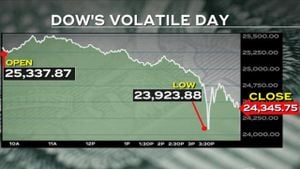Asian markets experienced varied reactions on Monday, as investors awaited rate decisions from local central banks and the U.S. Federal Reserve. The Indonesian rupiah dipped beyond the significant psychological threshold of 16,000 per U.S. dollar, influenced largely by external pressures and domestic economic stability.
The rupiah weakened by as much as 0.2%, raising concerns for monetary policy makers at Bank Indonesia ahead of their monetary policy meeting on December 18, where they are anticipated to maintain interest rates. Since reaching its peak in September, the rupiah has suffered over 6% decline, leaving many to speculate about potential policy adjustments. "The recent fall reflects Indonesia’s growing economic challenges and highlights the central bank's focus," analysts noted.
Similarly, the Malaysian ringgit faced downward pressure, extending its decline for six consecutive sessions, dropping 0.1% to its lowest since December 4. Economic forecasts indicate rising headline inflation, with expectations of the Bank Negara Malaysia keeping rates steady during their January 22 meeting. Yet, analysts warn of potential rate cuts if substantial economic slowdowns occur.
Adding to the uncertainty, the South Korean won initially appreciated by 0.5% following President Yoon Suk Yeol’s impeachment over the weekend. Yet, this momentum quickly reversed, leading to a 0.2% decrease to 1437.5 by 0723 GMT amid rising political uncertainty. "The won's initial strength following the impeachment reflected market optimism, but this has been clouded by fears of instability," said Poon Panchibool, markets strategist at Krung Thai Bank.
Expectations are mixed on South Korea's monetary policy going forward. "We could see the won strengthen toward 1,400 during Q1, allowing importers to hedge against foreign exchange risk," Panchibool added. Yet, he cautioned about potential tariff hikes from incoming U.S. President Donald Trump's administration, which could weaken the currency.
Globally, the U.S. dollar index hovered near three-week highs at 107.18. Investors remain watchful for the Federal Reserve's rate decision on December 18, with speculation surrounding slower monetary easing through 2025. The Fed's anticipated actions hinge significantly on inflation rates and labor market dynamics.
The Bank of Thailand is expected to hold its rates steady during its Wednesday meeting, aligning with predictions made by several economists. Meanwhile, the Philippines central bank may announce rate cuts on Thursday, following the reduction made last month. Both the Thai baht and Philippine peso traded largely flat on Monday.
Most Asian equities remained subdued as of Monday, with markets such as Bangkok down 1.1%, and Jakarta declining nearly 1%. Indian shares also fell, losing 0.5%. Such declines reflect broader concerns over economic resilience amid uncertainty associated with central bank policies.
The Bank of Japan is anticipated to maintain its current interest rates during its decision meeting on Thursday. Reports suggest policymakers need additional time to assess overseas risks and the labor market's outlook for the coming year.
Despite mixed outcomes from individual currencies and equities, broader trends indicate significant investor caution. Finance experts stress the importance of upcoming central bank meetings as they contend with both domestic and global economic challenges.
Further complications arise from the external environment, with China's factory output rising yet consumed demand remaining lackluster. Economic challenges persist for the Indian central bank as well, particularly concerning foreign exchange interventions. Moving forward, how central banks respond to these pressures might dictate market stability and economic growth trajectories.



